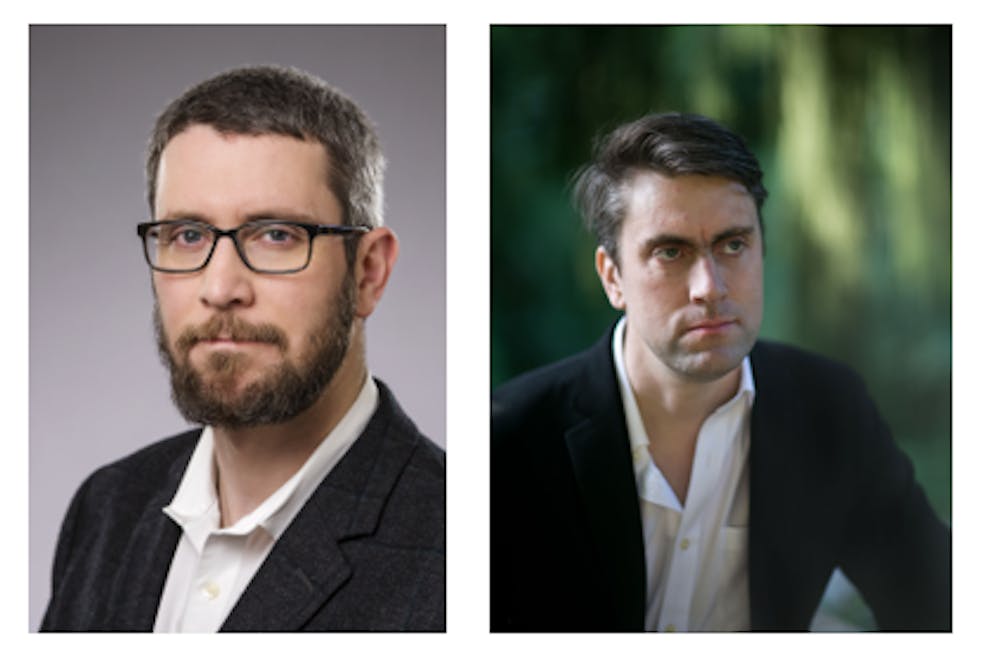On Thursday, Oct. 4, associate professor of chemical and biological engineering Clifford Brangwynne and mathematics professor Allan Sly were both named 2018 MacArthur Fellows for their work in cellular compartmentalization and probability theory, respectively.
Informally known as the “Genius Grant,” the MacArthur Fellowship is awarded to 25 individuals in the United States every year for their “extraordinary originality and dedication in their creative pursuits,” as well as “a marked capacity for self-direction.” Each fellow receives $625,000 with “no strings attached” from the John D. and Catherine T. MacArthur Foundation.
First and foremost a physics engineer, Brangwynne was recognized for his work at the Marine Biological Laboratory in Woods Hole, Mass., where he researches the processes that drive the organization of membraneless organelles by using principles of “soft matter” physics, or the physics of easily deformed objects, and cellular biology.
His work at the lab aims to advance scientific understanding of various diseases and develop techniques to treat them by synthesizing self-assembling biomaterials.
Brangwynne called the MacArthur Fellowship a special award since it aims to raise awareness of creativity in the sciences and to dispel the notion that art and science are two very separate disciplines. He noted that the nature of his own work is quite interdisciplinary.
“Making progress in biology and understanding how biological systems work requires people coming together from different disciplines,” Brangwynne explained.
Named a Sloan Research Fellow in 2014, a National Institutes of Health New Innovator, a Searle Scholar in 2012, and a Helen Hay Whitney Fellow from 2008 to 2010, Brangwynne has received numerous accolades for his contributions to biological engineering. Even so, he said that “there aren’t many awards” like the MacArthur Fellowship.
“[There] are no strings attached, and that freedom is amazing … I’m hopeful [the funds] will unleash new creative ideas in me,” Brangwynne said.

Brangwynne speculated that he would use the award money to take on more “risky” and “collaborative” projects in the near future and noted that he will also be free to travel to the lab more often. He expressed his appreciation to the University for its efforts to strengthen and expand the field of biological engineering on campus.
Sly, on the other hand, has not yet determined what he will do with his “Genius Grant.”
“It’s not very expensive to research mathematics,” he said, “so I will definitely have to think about what the best use of the money is going to be.”
Sly’s academic career is centered on discrete probability theory and its applications, particularly in the fields of physics and computer science. His research looks at random processes on random networks and the phenomena surrounding such networks.

“There is lots of randomness in lots of various systems,” Sly said. “And probability has lots of nice mathematics to help make sense of it… [My work] leads to many different places and uncovers relationships between seemingly unrelated fields.”
In the past, Sly has received multiple awards for his work, including the National Science Foundation Career Grant in 2017. He has published papers on his innovative approaches to many long-standing problems in probability theory, such as analyzing the cutoff phenomenon of the Ising model, an important statistical model for two-state systems.
He has also proven the satisfiability threshold for large k, showing that a lengthy and complex logical statement must meet certain criteria — first predicted by physicists — to be solvable, thus bridging theoretical computer science and statistical physics to simplify an important optimization problem.
“People like physicists have a very good understanding of how things in the universe work,” Sly said. “What we [mathematicians] do is turn that understanding into mathematics and provide them with a new source of ideas. We find a more general way to prove the results of their discoveries, so that they don’t have to write 120-page papers that prove just one problem anymore.”
MacArthur Fellows are selected from a pool of competitors who are all nominated by third parties. Sly said he was not aware that he was in the running for the MacArthur Fellowship until he received the phone call informing him that he had won, and to this day, he still does not know who nominated him.
“When I told [the MacArthur Foundation] that I had no idea about my nomination, they seemed quite pleased with themselves about it,” Sly recalled.
The award means a lot more than research funding to Brangwynne. “It means a lot to me to be honored alongside artists and dancers,” he said said.








